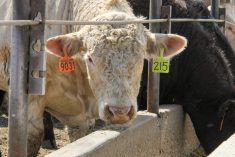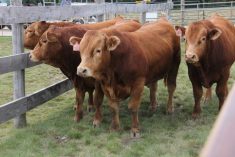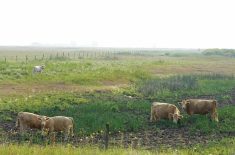Southeastern Manitoba’s latest on-farm cases of porcine epidemic diarrhea (PED) include one outside the buffer zones in which earlier cases have been found.
According to Manitoba Pork, the province’s chief veterinary officer (CVO) on Wednesday confirmed positive tests for PED on a hog nursery operation outside an existing five-kilometre buffer zone.
That case — along with two confirmed Tuesday at a finisher operation and a sow operation, both within a buffer zone of some previous cases — brings the region’s total of new on-farm cases to 13 since the beginning of May.
Read Also

Mexico agriculture secretary says still no date for restarting cattle exports to U.S.
Mexican Agriculture Minister Julio Berdegue said on Wednesday that Mexico and the United States have not yet set a date to resume Mexican cattle exports amid an outbreak of the flesh-eating screwworm parasite.
In all, Manitoba has now seen 23 on-farm cases of the virus since it first appeared in the province in early 2014 — all in its southeastern “hog alley.” Of the 23, nine are today considered “presumptive negative” for PED.
All veterinarians with clients within affected areas have been made aware of the location of the new sites, Manitoba Pork said Wednesday.
The industry agency on Wednesday noted “numerous situations” in which service providers have entered a hog operation’s yard, without barn staff made aware and “without procedures being followed to protect the disease-free status of the site.”
Hog farmers, the agency said, need to “control access into their yard and be in touch with every person entering the yard to ensure that biosecurity protocols are not breached.”
Producers, Manitoba Pork said, should “insist” that service providers — whether they work in the swine sector or not — call ahead to the hog operation prior so “proper measures can be taken” to avoid bringing the virus onto the lots.
“There are certainly linkages to things such as staff movement, to transport, potential contaminations on areas such as loadouts,” Dr. Glen Duizer of the CVO’s office told the industry-sponsored program Farmscape on Monday.
“We also have some external service providers that may be a link and we’re following up with some of those.”
Duizer also noted “some risks associated with movement of partial loads, where a load is filled at one site, then moved to another to complete the load.”
Among other risk factors, he said, the CVO has also “looked at things such as drainage and weather patterns, equipment movements, manure application, shared areas such as transport scales.”
Southern Ontario, which has confirmed the most on-farm PED cases in Canada — 102, since the virus’ first appearance there in early 2014 — last reported a new case on May 25, one of three in that province so far this year.
The PED virus causes severe dehydration and diarrhea in pigs and is generally fatal in very young piglets. It’s not transmitted to humans or other animals and is not a food safety risk. — AGCanada.com Network











